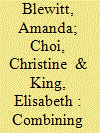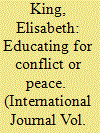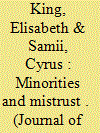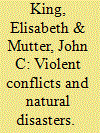| Srl | Item |
| 1 |
ID:
181080


|
|
|
|
|
| Summary/Abstract |
How can political science classes best prepare undergraduate students for the field of peace and conflict studies (PACS)? We argue that well-designed experiential learning activities provide opportunities for students to embrace complexity and practice adaptability, fusing the theoretical and practical in ways that prepare them to engage in PACS. This article presents one such experiential learning approach: a conflict analysis activity. Through engaging in a messy learning process, students (1) gain an increased theoretical understanding of the complexity of conflict, (2) practice adaptability, and (3) increase their self-efficacy. We provide a step-by-step description of the Conflict Analysis Tool exercise and reflect on how well the activity enables the use of knowledge and skills relevant for PACS. Our goal is that the insights gained through our approach will be helpful to other educators—from PACS to international relations to American politics and beyond.
|
|
|
|
|
|
|
|
|
|
|
|
|
|
|
|
| 2 |
ID:
069329


|
|
|
| 3 |
ID:
159745


|
|
|
|
|
| Summary/Abstract |
An enduring debate in the conflict management literature concerns the wisdom of recognizing versus avoiding reference to ethnic identities in institutions to manage ethnic conflict. Understanding why ethnic recognition occurs is crucial for informing this debate. We develop a theory based on functional and political mobilization effects of recognizing ethnic groups. Contrary to reasoning that minority leaders would be most interested in recognition, the theory suggests that recognition consistently favors the interests of leaders from larger, plurality groups, whereas minority leaders face a ‘dilemma of recognition’ between functional gains and mobilization threats. We use mixed methods to test our theory. For our quantitative analysis, we draw on an original coding of recognition in constitutions and comprehensive political settlements from 1990 to 2012. We find that for cases with leaders from plurality groups, recognition is adopted 60% of the time. With leaders from minority groups, the rate is about 40 percentage points lower, even after accounting for many background factors. Additional quantitative tests and a qualitative analysis present more detailed evidence to show that the processes correspond to the logic of our theory. Answering these questions about when and why recognition is adopted is a crucial step in evaluating its effects on conflict.
|
|
|
|
|
|
|
|
|
|
|
|
|
|
|
|
| 4 |
ID:
134643


|
|
|
|
|
| Summary/Abstract |
Comparisons between disasters and violent conflicts are often noted by political figures and in the news media, and those responding to conflicts and disasters witness similarities on the ground. In contrast, the academic fields studying violent conflicts and so-called natural disasters have developed separately and practitioners usually separate the two phenomena as soon as the emergency response is over. This paper, based on interviews with practitioners and a review of scholarly literature, makes a case for increased cross-disciplinary dialogue. We identify common consequences, responses and even causes of conflicts and disasters. We argue that more and better partnerships between those who work on conflicts and those who work on disasters can lead to advances in understanding and responding to conflicts and disasters.
|
|
|
|
|
|
|
|
|
|
|
|
|
|
|
|